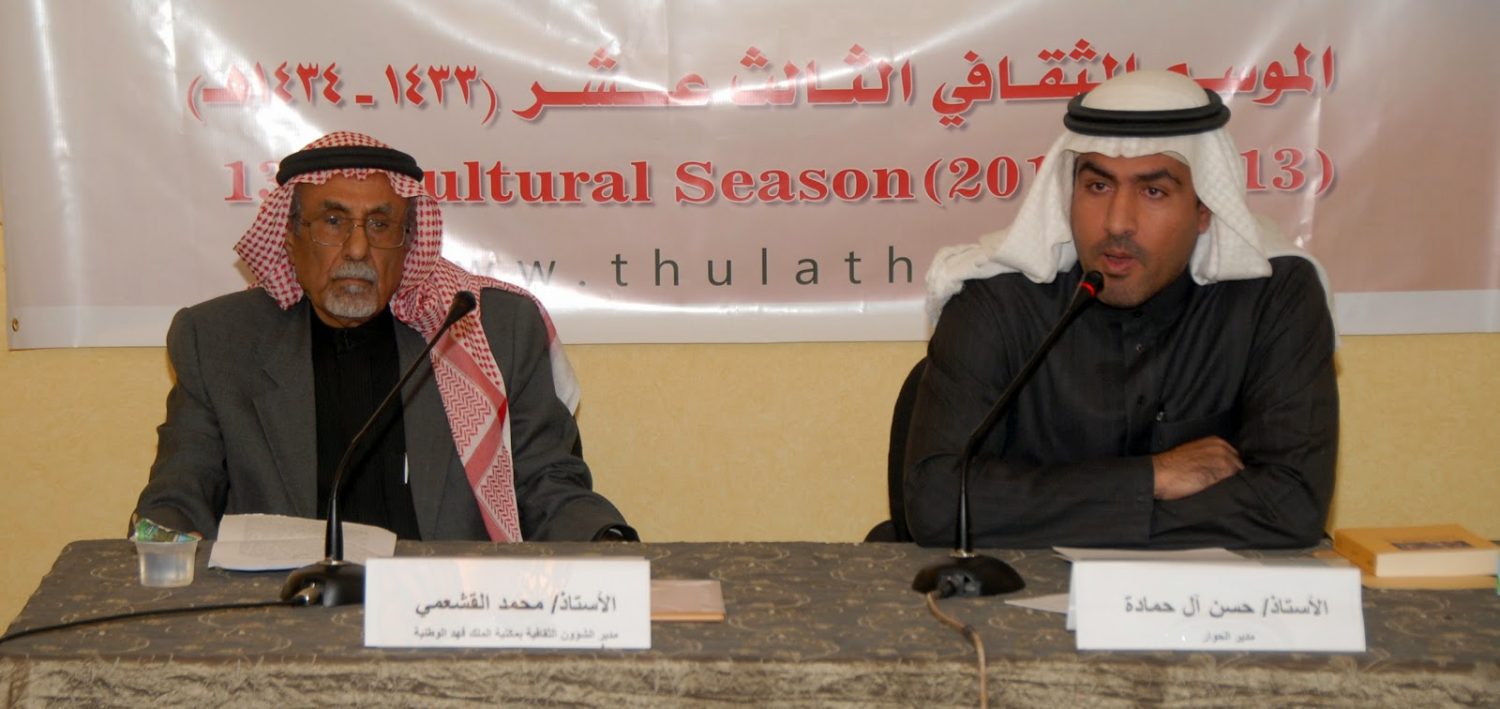Within a large group of intellectuals and writers, Mohammad AlQash’ami reviewed the beginning of his interests in the novelist AbdulRahman Munif which was in 1985. He mentioned that he worked on gathering Munif’s novels and books as well as the writings about him in newspapers and periodicals. He referred to his repetitive meetings and constant dialogues with the writer who was interested to follow up the recent literary publications in Saudi Arabia while he was living abroad.
The speaker talked about Munif’s early life. He was born to a Saudi father and an Iraqi mother in 1933, and was raised up in Amman, Jordan. Munif finished high school in 1952, and, at then, he was notably interested in reading everything he could reach of newspapers, magazines and pocket novels due to the lack of book stores in Amman at that time.
He moved to Iraq to finish his education in the Law Collage at the University of Baghdad, but he was deported from Iraq due to his opposition to Baghdad Pact. He continued his studies in Cairo, Egypt, and finished it at Yugoslavia specializing in Oil Economics. He moved to Beirut, Lebanon, to be politically active, then finally, to Baghdad to be involved in the Ba’ath Party.
The lecturer indicated that politics is what had led Munif to the field of literature which provided him the means to express his thoughts and ambitions. He illustrated that because of the political organization’s deficiency and the political thought’s incapability to contain that phase which went through major political events, Munif became more interested in culture and literature.
AlQash’ami added that although Munif stopped being involved in the Ba’ath party, he could not abandon politics entirely. He presented his political thoughts and convictions through literature, and focused on reviewing and criticizing the past political mistakes within his art.
The speaker, also, reported some of what had been said about Munif by significant Arab critics like Farouq AbdulQader who said: “subjective and objective conditions had allied together to make AbdulRaman Munif the Arab Citizen with distinction”. AlQash’ami ended reporting Munif’s words “no matter how hard the novelist tried to imagine the novel, it does not be without writing it. Writing is like developing the photo. Only, by writing, the novel would acquire its form, consistency and real features; before that, it is just a probability”.
In the time provided for comments and questions, Mohammad AlMarzouq, a journalist, wondered about the closeness of the quintet “Mudun AlMilh; The Salt Cities” to the reality in Arab societies especially after oil exploration. Mohammad AlHilal, a member of Culture and Arts Society, indicated that Munif was remarkably humanitarian apart from his political experience and literary works.
As for the Syrian journalist Yousif Shaghri, he referred to his relationship with Munif when he was living there. He said that the writer was extremely careful in presenting the details of his novels’ characters. Moreover, Hameed Al Saif, a novelist, addressed the features of novel writing by Munif especially in the quintet of “Mudun AlMilh” and how he conveyed a precise picture to the transformation from Bedouin to the modern life.
The program was accompanied by a photography exhibition by Nawal Al Hilal who talked briefly about her experience as well as the photography fields that she is interested in like nature, portrait and heritage.
Friday, 23 January, 2026
Trending
- منتدى الثلاثاء يناقش نشأة الحضارات الإنسانية
- القطيف تحتفي بالمفكر البليهي وتناقش نظرياته
- ثقافي / “الرؤية الإنسانية والعقل” .. ندوة بمنتدى الثلاثاء بالقطيف
- مثقفو الوطن يحتفون بتكريم المفكر ابراهيم البليهي في القطيف
- طروحات البليهي الفكرية على طاولة تشريح المثقفين
- This week’s topic: Che Content And Role Of Personal Libraries
- Althulatha Forum discusses the Scientific Inspiration and Future Orientations
- الاستاذ عبد الله البوشي – (لواء سابق)
- المهندس شفيق آل سيف
- الدكتور منصور المرزوقي
You might also like

